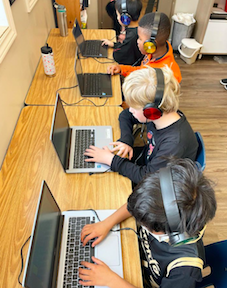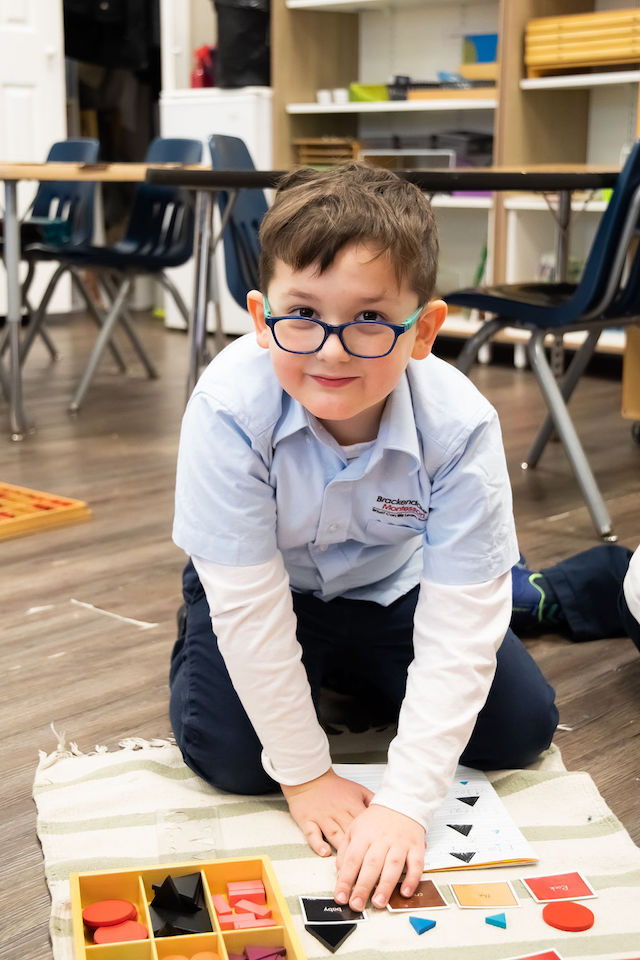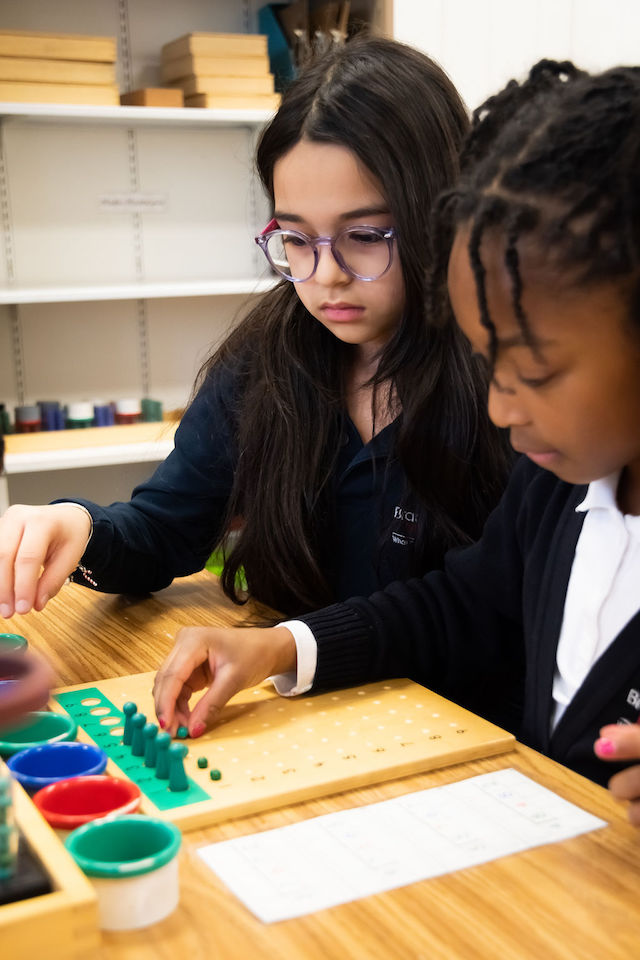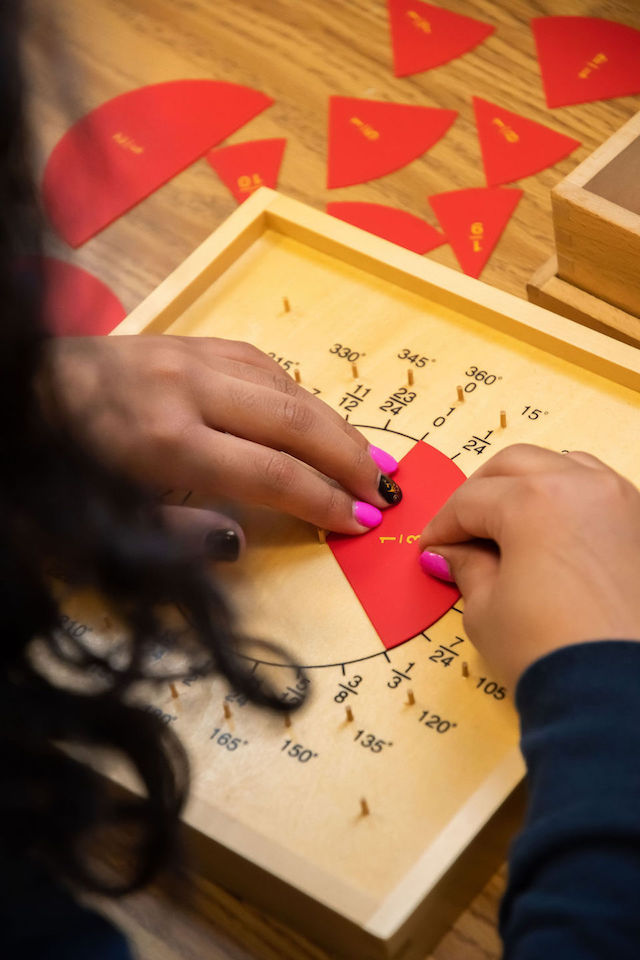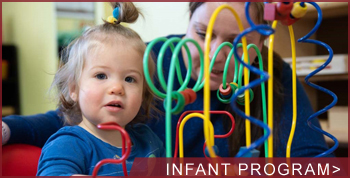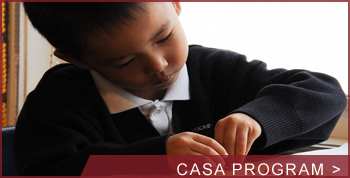Elementary Program
Our elementary program is individually catered to each child and is filled with hands on activities that cultivate tenacious learners. The children are welcoming and continue to gain independence by demonstrating care of self, others and their work. Our child centered program allows the child to develop at a tempo that is right for them. Each child’s pace and spurts of inspiration is anticipated and further challenged by the teacher. The child is guided and mentored by other children who have mastery of the task and then given the same opportunity to mentor. This process along with the teacher’s monitoring and tracking each child’s progress not only ensures academic success but mastery in critical milestones.
The program develops a global perspective which nurtures exploration of our natural and social environment, with emphasizes on critical thinking, problem solving and research skill development. Students expand their knowledge in a wide range of academic subjects; building on skills and social abilities that they developed in the primary classrooms. Their interests now soar into all areas of learning, and our classroom reflects this exciting new stage of development.
Every students progress is monitored daily and weekly using our online tracking system, Transparent Classroom. This is shared real-time with our parents and includes weekly pictorial evidence. This tool allows the teacher to set daily, weekly and monthly plans that is earmarked against semester goals. We use many benchmarks to ensure our children are more than ready for the next step. Student’s progress is mapped in measurable increments using the challenging expectation goals set by the teacher in our Transparent Classroom exceeding Ontario Ministry benchmarks.
Further, each child is administered a CTBS (Canadian Testing of Basic Skills). We choose the CTBS testing method because it is Canada wide and uses more international standards. Our students often exceed in these tests further demonstrating the effectiveness of our Elementary Program.
Great Lessons
Each year, our work in the elementary class begins with five important stories, called the “Great Lessons”. These stories dramatize known facts about the universe and the progression of human civilization. Through dramatic stories, experiments, charts timelines, and illustrations we centre the children’s interests by helping them create a picture of the whole universe at work. From here, our classroom opens up to endless possibilities as students follow their own
particular interests with a large measure of freedom. This unit of study forms the backbone that integrates our daily curriculum.
The Great Lessons are part of what Dr. Montessori called “cosmic education”. This is the child’s gradual discovery of how all things on earth in the past, present and future are interrelated. Through this work, the children develop a greater global vision of their world.
Language
The elementary language curriculum emphasizes creative and expository writing, interpretive reading of literature and poetry. We focus on word study, spelling, grammar, punctuation, penmanship and capitalization. Research skills are introduced, practiced through individual project work and refined as students work with a wide range of research materials. Students practice and use their reading and writing skills throughout the curriculum. Students further enhance their reading, critical thinking, and writing skills through the **SRA reading program.
**SRA Reading Laboratory programs work by color-coding portions of reading materials according to the reading ability level required. It emphasizes the role of the student in directing his own learning, assessing his own skills as he works his way up through the levels. The age range runs from kindergarten age through to grade 12 and beyond.
Mathematics
The mathematics curriculum is presented with concrete materials, which reveal arithmetic, geometric, and algebraic connections. Work with the Montessori mathematics materials ensures that mathematics is not simply memorized, but understood.
We extend the children’s knowledge of decimal system as they explore its quantities & qualities. Students practice operations of addition, subtraction, multiplication and division. We study number hierarchy, fractions, decimals, negative numbers, squaring & cubing. Throughout math work, we are continuously applying what we learn to how it relates in daily situations.
Geometry
Elementary students continue exploring geometry on a sensorial level. Students gain a strong understanding of fundamental geometric concepts through consecutive lessons with Montessori materials. Students begin with a study of congruency, similarity & equivalence, preparing them for later area and theorem work. We introduce the study of lines, measurement of angles and the construction of geometric figures.
History
History work in the elementary class begins with the development of the solar system, and early life on earth. Students study aspects of early civilizations, the development of humankind, and recorded world and Canadian history. Students learn how the contributions of humankind throughout history have brought us to where we are today.
Geography
Elementary students extend their knowledge of continents and countries with further research about the people, language and culture of different lands. Map work continues with the study of geographical features and landforms.
Science
In this area, the children’s natural curiosity is stimulated through discovery projects and experiments, from which they draw their own conclusions. The first science experiments are designed to give the children basic knowledge, which will help them to understand the development of the solar system, the earth and its configurations, life on earth and the needs of plants and animals.
Enriched Programs (Going Beyond the Curriculum)
We supplement our program to provide further learning and exploration exercises for our students. Enriched programs include: Coding; Typing; Chess; Science Workshops; Gross Motor Field Trips such as Karate, Gymnastics, Soccer; Field Trips; Robotics

